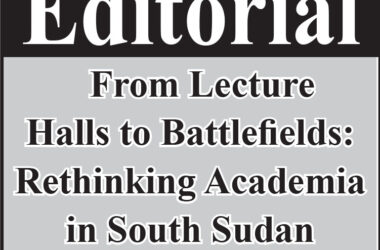As Northern Bahr El Ghazal state sets strategies to address gang-related crimes, the architecture must know that success of the exercise lies in inclusion of all stakeholders and the use of “change” mechanism.
This is not only Northern Bahr El Ghazel problem, every major town in the country grows its own breeds of criminal gangs, it’s a growing national challenge that must be handled in a broader spectrum.
Whatever methods, the states put in place, but unless it gears towards reforming suspects and perpetrators, the resultant effects might be dire than expected.
By “Stakeholders”, this means the state authority, religious and cultural leaders, suspected actors and their parents or relatives and potential victims.
Meanwhile, arrests and detentions have been a common approach in attempts to curb criminality, in more cases these only act as catalysts to catapult the vice. This will create indefinite congestion of detention facilities and resources utilized without end.
In detention facilities where minors are crammed with adults, those incarcerated get more skills from their seniors, which aids their ability to persist in the trade and also breeds additional core criminality in society.
Taking into mind that those involved in criminal acts are neither superhumans nor spiritual beings and our brothers, sisters, sons and daughters, who dine and wine with us, all times. Only circumstances push these individuals to act in another way, which impacts negatively to society.
Not siding with the contradictory actors but to conduct a diagnostic analysis on the factors giving rise to gang crimes in the country, we must look at the way we treat out children at home.
As a child is born holy, innocent and begins to grow in obedience, but where does the trend get distorted that they end up in divergent characters? The answer lies in the quality of society they are brought up in. How has our 13-year-old country been treating her children?
Arrests and detentions will only overwork security personnel and exhaust them to their bones, yet the best solution rests in drawing a comprehensive plan for the welfare of entire children in the country.
Societal disparities are other factors that continue triggering animosity and disharmonies that compel one party to seek criminal means to sort out their grievances.
Unless we build more schools, recreational and health facilities, create an atmosphere conducive for individuals to participate in income-generating enterprises, gang crimes won’t end.




